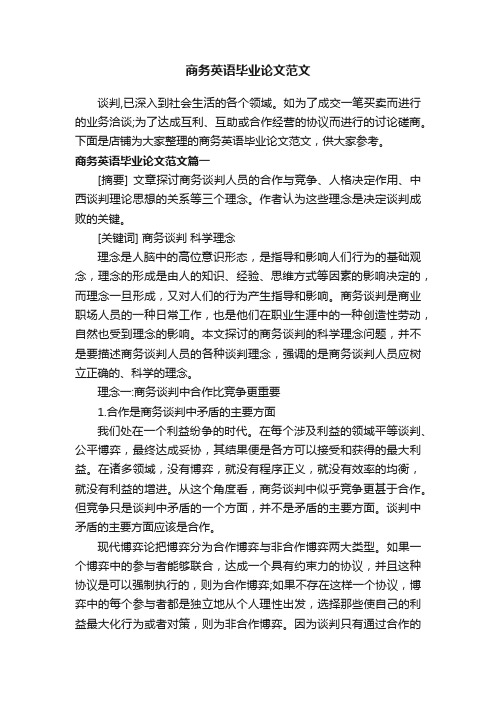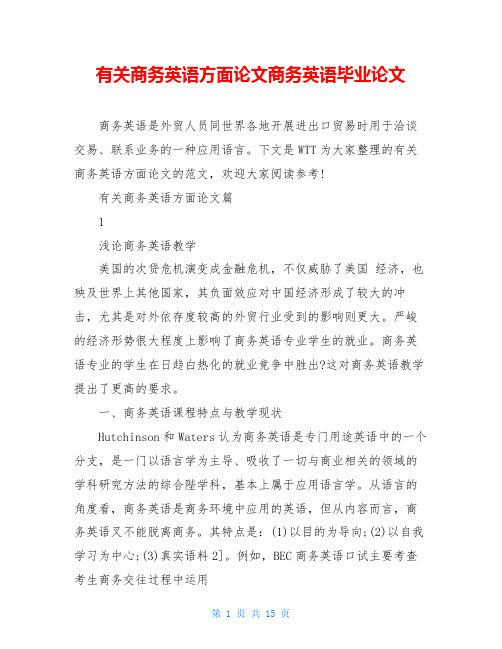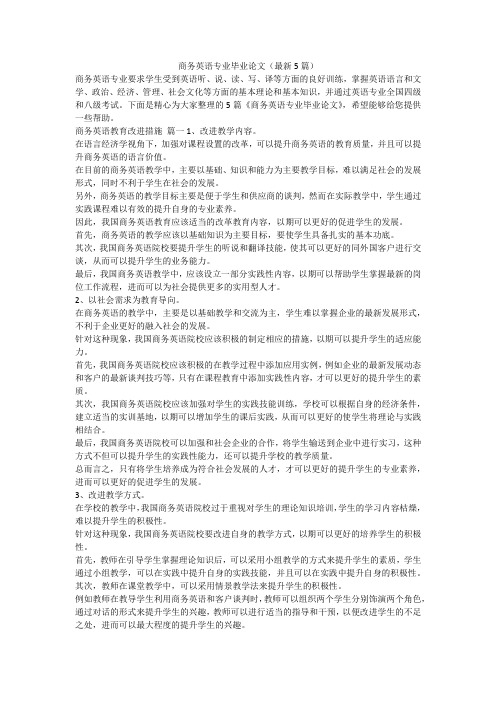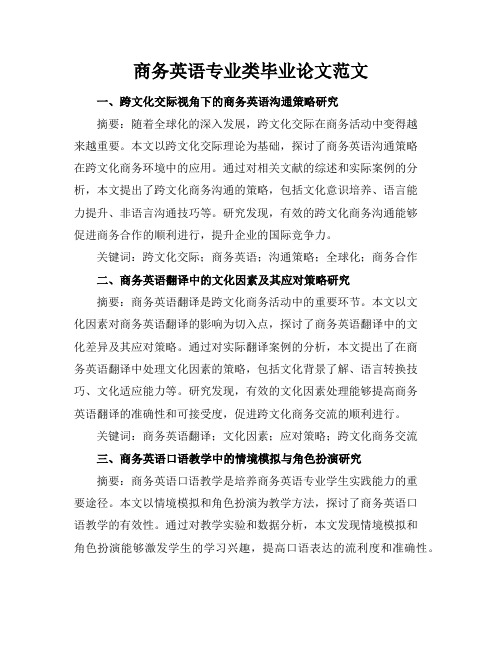商务英语毕业论文
商务英语专业类毕业论文范文

商务英语专业类毕业论文范文随着经济一体化的趋势越来越明显,商务活动愈加频繁,随着国际贸易进一步发展,国际商务往来日益密切。
商务英语专业应运而生。
下文是店铺为大家搜集整理的关于商务英语专业类毕业论文范文的内容,欢迎大家阅读参考!商务英语专业类毕业论文范文篇1商务英语对国际商务谈判的影响摘要:近年来,经济一体化进程逐渐加快,国际商务活动越发频繁,商务谈判逐渐增多。
商务英语作为主要的国际商务谈判语言交流手段,其地位不言而喻,直接关系到商务谈判的成败。
为了充分发挥商务英语在商务谈判中的作用,掌握国际商务谈判及商务英语的含义,应对商务英语在国际商务谈判中的应用做深入研究。
关键词:商务谈判;语用策略;预期目标随着国际贸易发展进程的逐渐加快,经济组织和企业之间的交流合作越发频繁,贸易往来不断增加。
为了最大限度地实现谈判双方利益共赢,掌握商务谈判技巧,我们就商务英语谈判策略和技巧等加以分析论述,希望通过谈判的方式更好地实现谈判目标。
1商务英语及国际商务谈判的含义常言说得好,商场如战场,随着全球经济化发展进程的加快,经济交流合作也越加频繁。
作为当前国际应用最广泛的通用语言,商务英语谈判已经成为国际商务谈判的重要手段,商务英语顾名思义就是在商务活动当中所使用的英语,而其又涉及语言运用、文化背景、国际惯例及交际技巧等多方面内容。
商务英语内涵极为丰富,如果能够在国际商务谈判中充分发挥商务英语作用,就可以利用英语加强相互之间的交流,减少沟通上的障碍,加强相互之间的理解。
国际商务谈判并非浅显的一言一行,而是一项复杂的交流沟通过程,如何在谈判过程中取得优势,得到满意的谈判结果,这是每个企业都将要面临的全新课题。
商务谈判的成败直接影响社会效益和经济效益,谈判人员除要掌握商务业务、法律法规和谈判原则外,还应掌握必备的谈判技巧和语用策略,谈判人员还应了解世界各国文化,这样才能达到知己知彼的目的,更好地达到预期谈判目标。
1.1商务英语的内涵商务英语是指交易双方在商务活动中使用的交流语言,它是英语在商务活动中逐渐适用而产生的一种社会功能变体,其针对性较强。
商务英语毕业论文范文

商务英语毕业论文范文谈判,已深入到社会生活的各个领域。
如为了成交一笔买卖而进行的业务洽谈;为了达成互利、互助或合作经营的协议而进行的讨论磋商。
下面是店铺为大家整理的商务英语毕业论文范文,供大家参考。
商务英语毕业论文范文篇一[摘要] 文章探讨商务谈判人员的合作与竞争、人格决定作用、中西谈判理论思想的关系等三个理念。
作者认为这些理念是决定谈判成败的关键。
[关键词] 商务谈判科学理念理念是人脑中的高位意识形态,是指导和影响人们行为的基础观念,理念的形成是由人的知识、经验、思维方式等因素的影响决定的,而理念一旦形成,又对人们的行为产生指导和影响。
商务谈判是商业职场人员的一种日常工作,也是他们在职业生涯中的一种创造性劳动,自然也受到理念的影响。
本文探讨的商务谈判的科学理念问题,并不是要描述商务谈判人员的各种谈判理念,强调的是商务谈判人员应树立正确的、科学的理念。
理念一:商务谈判中合作比竞争更重要1.合作是商务谈判中矛盾的主要方面我们处在一个利益纷争的时代。
在每个涉及利益的领域平等谈判、公平博弈,最终达成妥协,其结果便是各方可以接受和获得的最大利益。
在诸多领域,没有博弈,就没有程序正义,就没有效率的均衡,就没有利益的增进。
从这个角度看,商务谈判中似乎竞争更甚于合作。
但竞争只是谈判中矛盾的一个方面,并不是矛盾的主要方面。
谈判中矛盾的主要方面应该是合作。
现代博弈论把博弈分为合作博弈与非合作博弈两大类型。
如果一个博弈中的参与者能够联合,达成一个具有约束力的协议,并且这种协议是可以强制执行的,则为合作博弈;如果不存在这样一个协议,博弈中的每个参与者都是独立地从个人理性出发,选择那些使自己的利益最大化行为或者对策,则为非合作博弈。
因为谈判只有通过合作的博弈才能有双赢的结果。
有谈判学家认为,谈判是否成功,不是取决于所要解决的问题是对抗性的还是非对抗性的,而是取决于:(1)该问题是否可以通过谈判解决;(2)谈判者是否不仅乐于“争”和“取”,而且愿意做出条件的交换和相应的妥协;(3)谈判者是否能在一定程度上相互信任。
有关商务英语方面论文商务英语毕业论文

有关商务英语方面论文商务英语毕业论文商务英语是外贸人员同世界各地开展进出口贸易时用于洽谈交易、联系业务的一种应用语言。
下文是WTT为大家整理的有关商务英语方面论文的范文,欢迎大家阅读参考!有关商务英语方面论文篇1浅论商务英语教学美国的次贷危机演变成金融危机,不仅威胁了美国经济,也殃及世界上其他国家,其负面效应对中国经济形成了较大的冲击,尤其是对外依存度较高的外贸行业受到的影响则更大。
严峻的经济形势很大程度上影响了商务英语专业学生的就业。
商务英语专业的学生在日趋白热化的就业竞争中胜出?这对商务英语教学提出了更高的要求。
一、商务英语课程特点与教学现状Hutchinson和Waters认为商务英语是专门用途英语中的一个分支,是一门以语言学为主导、吸收了一切与商业相关的领域的学科研究方法的综合陛学科,基本上属于应用语言学。
从语言的角度看,商务英语是商务环境中应用的英语,但从内容而言,商务英语叉不能脱离商务。
其特点是:(1)以目的为导向;(2)以自我学习为中心;(3)真实语料2]。
例如,BEC商务英语口试主要考查考生商务交往过程中运用英文的能力。
商务交往主要包括建立和保持商务联络、谈论工作、制定计划与安排工作等,目的性和实用性较强。
20xx年高等教育出版社出版的《体验商务英语》还设置了真实的案例分析。
改革开放后,中国众多高校纷纷开设“经贸英语”、“商贸英语”、“商务英语”以及“外贸英语”等课程,培养既通晓外语又精通国际商务的复合型人才。
有的院校如上海对外贸易大学还开设了相关的研究生课程。
另外,出版了一系列商务英语教材,例如英国剑桥大学出版社出版的级商务英语教材,与其相关的商务英语考试和培训已获得了广泛的关注和肯定。
但是,我国多数讲授商务英语的英语教师由于受专业知识的限制,往往用讲授基础英语的方法进行商务英语教学,以词汇和语法教学为主;而多数讲授商务英语的商务专业课教师由于缺乏语言教学的经验,教学中以翻译为主。
关于商务英语毕业论文

关于商务英语毕业论文范文一:商务英语翻译课程改革思考[摘要]本文基于创新教育的背景下,阐述目前高职商务英语翻译教学的现状与问题,以课程项目化为导向,从课程设置、教学方法和模式等方面来探讨如何构建有效的商务英语翻译教学模式。
[关键字]商务英语翻译;项目化;课程改革《商务英语翻译》课程是高职院校商务英语专业的一门必修课,是一门集英语语言、文化知识、商务知识、翻译知识和翻译技能于一体的工学结合课程,旨在让学生在未来的工作岗位中能胜任一些基本的口笔译任务及向专业翻译方向发展奠定一定的基础。
在创新创业教育的背景下,如何做好商务英语翻译教学改革成为高职院校的重要任务之一。
在本文中,笔者从高职商务英语翻译教学的现状和相关建议展开探析,重点探讨改革高职商务英语翻译教学的创新策略。
一、课程改革背景目前,高职院校商务英语翻译教学存在教学内容枯燥、教学方法刻板单一、教学手段落后和师资力量相对薄弱等问题,培养的学生难以满足社会就业的需求,商务英语专业的毕业生在走上外贸、涉外事务等工作岗位后可能要解决与商务翻译有关的工作任务,但由于缺乏良好的英语应用能力,难以胜任此项工作。
大多数高职商务英语翻译教学离“岗位需求”相距甚远,缺乏有针对性的翻译教学实践活动。
即使有些高职院校是按照理论教学和实训教学相结合的方式来安排教学,但实际上翻译理论和翻译实践存在严重脱节现象。
另外,高职商务英语翻译教学方式仍然主要沿用传统的填鸭式教学,这严重忽视了学生的主体地位,学生被置于被动接受的地位,难以实现翻译教学的预期目标,商务英语翻译作为实践性特别强的一门学科,如若继续采用传统的填鸭式教学将会严重阻碍学生学习的自主性以及学习效率的提高,致使高职商务英语翻译人才的专业水平普遍不高,市场竞争力不足。
因此,对商务英语翻译教学进行改革和创新势在必行,必须以学生就业岗位上的典型工作任务为基点,本着课程跟着岗位走的理念,以培养学生的翻译实践能力为目标,基于真实或者仿真的翻译项目来构建商务英语翻译课程理论知识新体系,口笔译翻译标准、技能、方法以及有关商务知识融为一体。
商业英语论文范文3篇

商业英语论⽂范⽂3篇论⼴告英语是具有商业价值的实⽤⽂体[摘 要] 英语⼴告语⾔作为现代语⾔的重要组成部分,有其独特的词汇特⾊和修辞特⾊,这些特⾊体现了英语⼴告语⾔的独特语⾔魅⼒,使⼴告英语成为语⾔艺术魅⼒与商业推销的有机结合体。
[关键词] ⼴告 词汇 修辞 艺术魅⼒ 商业推销随着社会的发展,⼴告在商业竞争中显得越来越重要。
⼴告的职能是⽤最吸引⼈的⽅式介绍⼀个商品的质量,清楚地说明购买该商品的理由,引起⼤众对它的注意和好感,英语论⽂并⽴即产⽣购买它的欲望。
这就决定了⼴告英语必须达到迅速影响和劝告的作⽤。
⼴告英语这种通过表意和移情⽽实现劝说功能的语⾔,同讲究⽣动形象、含蓄蕴藉与追求各种艺术效果的⽂学语⾔相⽐,以及同讲究真实、简明的新闻报道语⾔相⽐,可以说具有奇特的语⾔形式和⽂体特点。
⼀、⼴告⽂字创作的重要特征1.⽂字新颖醒⽬,刺激记忆,促进销售。
2.重复—成功⼴告之秘诀(不论是⼴告的重复出现,还是⼴告⽂字中的运⽤重复修辞⼿段)。
3.⽂字简单—有时⼈们并不⼀定想阅读⼴告,因此,⼴告则必须迅即表述其信息内容,不可浪费语⾔⽂字。
字词、句⼦、段落的简短有助于阐明信息,使之易于阅读,接受。
4.⽂字通俗易懂,涵义明确—如果读者迟疑在某⼀不认识的字前,该⼴告⾃然失去了应有的注意⼒。
因此,⼴告⽂字语⾔须通俗易懂,涵义明确,不可⽤深奥难解,涵义模糊之词。
⼆、⼴告英语的⽤词特点1.作为传播信息的⼿段,⼴告英语的⽤词与普通英语有着很⼤的区别,它必须⼀⽬了然,⽣动、形象,富于感情⾊彩和感染⼒,读起来,朗朗上⼝。
如:different countries different languages different customs one level of comfort, worldwide(⼀家航空公司的⼴告)。
动词多⽤短⾳节的最常⽤的词,⽐较上⼝。
2.模拟创造新词。
为了促销其产品,⼴告商总是不断地挖空⼼思,创造新词,借以标新⽴异,吸引顾客按照英语的构词规律,毕业论⽂造⼀个独创的、能为读者所理解的词或短词,可有效地加强⼴告的新奇和⽣动,也增强吸引⼒。
大学商务英语毕业论文

大学商务英语毕业论文商务英语是以国际间的商务往来为基础的语言交流,商务英语包括的范围比较广。
下文是店铺为大家整理的关于大学商务英语毕业论文的范文,欢迎大家阅读参考!大学商务英语毕业论文篇1浅论商务英语翻译的技巧商务英语所涉及的范围比较广泛,涉及各行各业,这也就决定了从事商务英语翻译的人不仅仅需要有扎实的英语基本功,还有对其他方面的英语进行了解,这样一来才能使交易双方能够更好地沟通,完成交易。
现如今,整个世界融为了一个整体,各个国家之间的贸易往来逐渐丰富,目前在国际间最通用的就是英语。
商务英语要求翻译者更加的精确、对等,因为商务英语中会涉及到很多文件、条款等信息,所以必须要精确。
只有这样才能达到双方活动的顺利进行。
尤其在我国,中西方文化差异较大,更应该注意这方面的问题。
一字之差就容易铸成大错。
所以,做好商务英语的翻译工作尤为重要。
本文针对这一问题展开讨论,分析了商务英语的翻译技巧。
1. 商务英语及商务英语翻译的概括商务英语涉及范围很广,包括的种类也十分多。
大部分跟国际商务活动有关的例如:国际贸易、会计、金融等方面所用到的英语都属于商务英语的范围。
它涉及的领域主要包括对外贸易、招商引资、国际旅游、海外投资以及国际运输等方面。
除了领域广泛之外,它还包括许多专业的英语例如:广告英语、法律英语、应用文英语、包装英语等。
因此,伴随着国际贸易的范围不断的扩大,越来越多的人,开始加入到翻译的这一事业之中。
对商务英语的翻译,在很长时间以来备受关注,商务英语翻译工作也是一项十分复杂的工作,由于其用途的广泛性和特殊要性,就决定了商务英语的翻译工作不能仅仅局限于传统的翻译中务词汇和具有较好的商务语法基础,这些是一个翻译者应该具备的原则和技巧,不能仅仅依靠“信、达、雅”的翻译要求来完成商务英语的翻译工作,必须依照商务文件的愿意,把它翻译的既能清楚的表达意义,又能够符合商务双方的语言习惯。
在翻译的过程中一定要从实际情况出发,做到具体问题具体分析。
商务英语专业毕业论文(最新5篇)-最新

商务英语专业毕业论文(最新5篇)商务英语专业要求学生受到英语听、说、读、写、译等方面的良好训练,掌握英语语言和文学、政治、经济、管理、社会文化等方面的基本理论和基本知识,并通过英语专业全国四级和八级考试。
下面是精心为大家整理的5篇《商务英语专业毕业论文》,希望能够给您提供一些帮助。
商务英语教育改进措施篇一1、改进教学内容。
在语言经济学视角下,加强对课程设置的改革,可以提升商务英语的教育质量,并且可以提升商务英语的语言价值。
在目前的商务英语教学中,主要以基础、知识和能力为主要教学目标,难以满足社会的发展形式,同时不利于学生在社会的发展。
另外,商务英语的教学目标主要是便于学生和供应商的谈判,然而在实际教学中,学生通过实践课程难以有效的提升自身的专业素养。
因此,我国商务英语教育应该适当的改革教育内容,以期可以更好的促进学生的发展。
首先,商务英语的教学应该以基础知识为主要目标,要使学生具备扎实的基本功底。
其次,我国商务英语院校要提升学生的听说和翻译技能,使其可以更好的同外国客户进行交谈,从而可以提升学生的业务能力。
最后,我国商务英语教学中,应该设立一部分实践性内容,以期可以帮助学生掌握最新的岗位工作流程,进而可以为社会提供更多的实用型人才。
2、以社会需求为教育导向。
在商务英语的教学中,主要是以基础教学和交流为主,学生难以掌握企业的最新发展形式,不利于企业更好的融入社会的发展。
针对这种现象,我国商务英语院校应该积极的制定相应的措施,以期可以提升学生的适应能力。
首先,我国商务英语院校应该积极的在教学过程中添加应用实例,例如企业的最新发展动态和客户的最新谈判技巧等,只有在课程教育中添加实践性内容,才可以更好的提升学生的素质。
其次,我国商务英语院校应该加强对学生的实践技能训练,学校可以根据自身的经济条件,建立适当的实训基地,以期可以增加学生的课后实践,从而可以更好的使学生将理论与实践相结合。
最后,我国商务英语院校可以加强和社会企业的合作,将学生输送到企业中进行实习,这种方式不但可以提升学生的实践性能力,还可以提升学校的教学质量。
商务英语专业类毕业论文范文

商务英语专业类毕业论文范文一、跨文化交际视角下的商务英语沟通策略研究摘要:随着全球化的深入发展,跨文化交际在商务活动中变得越来越重要。
本文以跨文化交际理论为基础,探讨了商务英语沟通策略在跨文化商务环境中的应用。
通过对相关文献的综述和实际案例的分析,本文提出了跨文化商务沟通的策略,包括文化意识培养、语言能力提升、非语言沟通技巧等。
研究发现,有效的跨文化商务沟通能够促进商务合作的顺利进行,提升企业的国际竞争力。
关键词:跨文化交际;商务英语;沟通策略;全球化;商务合作二、商务英语翻译中的文化因素及其应对策略研究摘要:商务英语翻译是跨文化商务活动中的重要环节。
本文以文化因素对商务英语翻译的影响为切入点,探讨了商务英语翻译中的文化差异及其应对策略。
通过对实际翻译案例的分析,本文提出了在商务英语翻译中处理文化因素的策略,包括文化背景了解、语言转换技巧、文化适应能力等。
研究发现,有效的文化因素处理能够提高商务英语翻译的准确性和可接受度,促进跨文化商务交流的顺利进行。
关键词:商务英语翻译;文化因素;应对策略;跨文化商务交流三、商务英语口语教学中的情境模拟与角色扮演研究摘要:商务英语口语教学是培养商务英语专业学生实践能力的重要途径。
本文以情境模拟和角色扮演为教学方法,探讨了商务英语口语教学的有效性。
通过对教学实验和数据分析,本文发现情境模拟和角色扮演能够激发学生的学习兴趣,提高口语表达的流利度和准确性。
同时,本文还提出了在商务英语口语教学中应用情境模拟和角色扮演的具体方法和注意事项。
关键词:商务英语口语教学;情境模拟;角色扮演;实践能力;教学方法四、商务英语专业课程设置与就业需求对接研究摘要:商务英语专业的课程设置需要与就业需求相匹配,以提升学生的就业竞争力。
本文以我国某高校商务英语专业为例,通过调查分析企业对商务英语专业毕业生的需求,提出了优化课程设置的建议。
研究发现,企业对商务英语专业毕业生的语言能力、跨文化交际能力、商务知识等方面有较高要求。
- 1、下载文档前请自行甄别文档内容的完整性,平台不提供额外的编辑、内容补充、找答案等附加服务。
- 2、"仅部分预览"的文档,不可在线预览部分如存在完整性等问题,可反馈申请退款(可完整预览的文档不适用该条件!)。
- 3、如文档侵犯您的权益,请联系客服反馈,我们会尽快为您处理(人工客服工作时间:9:00-18:30)。
(第一篇)S.W.O.T. AnalysisIn modern strategic management and planning, SWOT analysis is a widely known diagnostic tool. SWOT analysis refers to understanding the strength and weakness of the competitors relative to oneself, and realising the opportunities andthreats that the environment may impact on one's business. Interestingly, SWOT analysis was already advocated by Sun Tzu more than 2,000 years ago when he said :"Know your enemy, know yourself, and your victory will notbe threatened.Know the weather, know the terrain, and your victory willbe complete.In fact, "know your enemy, know yourself" is probably the most well-known phrase in Sun Tzu's Art of War. It is alsothe most cited phrase. Even Mao Tse-tung was known to say, " Know your enemy, know yourself; hundred battles, hundred won". Similarly, many Japanese samurai warriors in the past had quoted aspects of this particular famous phrase by Sun Tzu. In my lectures to executives around the world, I have often used this phrase to argue that what we now commonly called SWOT analysis is not a modern "invention" from the Western world. Rather, it originated in China more than2,000 years ago. It is a pity that the Chinese have notbeen able to exploit the wisdom that underlies this sayingby Sun Tzu. Let me explain."Know your enemy, know yourself" is tantamount to knowing one's strengths and weaknesses relative to those whom we are fighting against (e.g. the competitors, in the case of business). Similarly, "Know the weather, know the terrain"is tantamount to knowing the opportunities and threats posed by the environment. They are the external or uncontrollable factors. Interestingly, in business we also have suchexternal factors that affect the way we do things. For example, we often talk about the business climate (the weather) and the physical or infrastructural factors (the terrain), and how they can impact on the conduct of business. Thus, while it is very apparent that while theinfrastructural factors are in Asia's favour right now (twonew world class international airports have just been openedin Malaysia and Hongkong), the business climate has been dampened by the financial crisis that began in July 1997. Ironically, many of these external factors are beyond the control of any single country.Besides understanding the direct application to SWOT analysis, what is interesting to note is that Sun Tzu apparently placed more emphasis on understanding the enemy and oneself first. This is not only evident in thequotation cited earlier, but is also supported by another ofSun Tzu's saying:"He who has a thorough knowledge of the enemy and himself is bound to win in all battles.He who knows himself but not the enemy has only an even chance of winning.He who knows not the enemy and himself is bound to perish in all battles."The need to place greater emphasis on understanding the enemy and oneself may not be very apparent to many readers. However, on closer reflection and analysis, there isprofound logic in Sun Tzu's arguments. In war, and businessis no different, the probability of winning or losingdepends a lot on whom you are fighting against. You may be very strong, but if your competitor is much stronger thanyou, you become weaker by comparison. The chances of winning are then greatly diminished. In other words,absolute strengths alone do not determine the outcome of a competition. Rather, winning or losing is based more on relative strengths. What is important to recognise is thatyour strengths or your weaknesses do not change overnight.In other words, they remain relatively constant or static.In contrast, in any competitive situation, whether you are weaker or stronger will be determined by your competitors(or enemies in the case of war). If your competitors are weaker today, you are stronger. However, you will become weaker in the face of a stronger competitor! In essence,competitive forces are dynamic and changing all the time. By focusing on the competitive forces, you will be "forced" to be more responsive, adaptive and flexible. In the process, the management of change and learning how to overcome changes will become an intrinsic part of your behaviour and strategy development. This is what generals in war and senior executives are trained to do! Unfortunately, in actual operations or competitive situations, many generals and senior executives fall short of their training!There are other reasons to focus on the competitors first rather than oneself. Through detailed analysis of the competitors, it is possible to win even if you are weak! This can be done by avoiding the strengths of the competitors. In fact, this was exactly what the Japanese manufacturers did in the 1950s and 1960s.(第二篇)。
